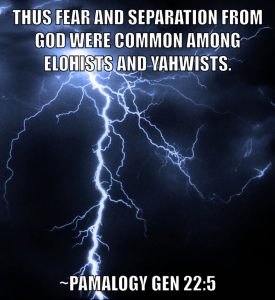GENESIS
XXII
the Elohists
1And according to a majority of academics, the Elohists writings were penned in the ninth century BCE. 2And they theorized that their writings were shared with the scribes of Judah by some from the north when they sought refuge there when the Samaritans and Assyrians were oppressing them. 3And the writings of the Elohists loved the phrase fear God. 4That is, fear El, fear Elohi or fear Elohim. 5Thus fear and separation from God were common among Elohists and Yahwists.

Elohist and Yahwist contrasts
6So also did both traditions regard Moses as the law giver through whom God spoke. 7Only the Elohists said he gave the law from Mount Horeb, they said, which was in the north of Israel, while the Yahwists said the law was given from Mt Sinai, a place in the wilderness as far south as Israel ever claimed divine promise of territory. 8And the Elohists worshiped in Shechem but the Yahwists in Jerusalem. 9And a Yahwist supplied a lamb in the thicket when Abram went to sacrifice his son Isaac in obedience. 10And a Yahwist located the sacrifice on Mount Moriah, while the Elohists may have assumed Isaac was slain and El was pleased, many academics suggested.
timing of the combined tradition
11Now in the theories of the academics, the combination of Elohist and Yahwist tradition in a single set of writings took place some time after the fall of Shechem to the Samaritans, as the Assyrians were deporting them and Judah took in their refugees. 12And at that time the kings of Judah resolved disputations over the divergent traditions. 13For they and their priests held that the ark of the covenant was located in Jerusalem on Mt Moriah in the Temple constructed by Solomon. 14And this is what most of the academics supposed had happened. 15And many of them imagined that the priestly tradition also began at that time, while holding that the bulk of priestly writing took place centuries later.
fundamentalism serves kings in every age
16And the fundamentalists believed in the early dating of the texts in every age. Thus they readily believed that the Law was given by Moses first at Sinai and then again in greater detail at Horeb. 17And they believed that the Israelites did not settle in the land until God performed miracles in a conquest that reached the west side of the Jordan after Moses died around 1400 BCE. 18And the people of the land trusted in their rulers. 19And they accepted such things with simplicity by faith. 20And those who disbelieved them were considered disobedient. 21And the many feared God, which was most convenient for their rulers, who were supposed to have possessed the words of God, especially since there was only one God and not many.
stronger together
22And Elohism without Yahwism offered little divine personality. 23And Yahwism without Elohism made the tribes of the north less relevant, especially Ephraim, offering little human personality. 24For the stories of Joseph’s fidelity and dreams and steadfast patience served as an example of fidelity. 25And they richly enhanced the stories of Israel’s descent into Egypt as they explained why Ephraim and Manasseh had a divine right to abundant territory beyond the other tribes, as explained by the Elohists. 26But united Yahwism and Elohism were stronger.
27And thus the two traditions were blended, precisely how, the academics were uncertain, but the combination provided inspiring stories of tragic heroes and the emergence of a nation under the guidance of the most powerful God on Earth. 28And Ephraim and Manasseh were named after Joseph’s twins so that Joseph was honored with a double blessing.
29And whether the fundamentalists or the academics were the more accurate in their assumptions, in the story of Joseph was preserved the sacred number twelve. 30And the Levites were not allocated territories, which served both the north and south. 31And to the general satisfaction of the people of Israel, the substitution of this tribe made way for the priestly class to receive tithes and feed on sacrifices as compensation for their services.
32And thus was Israel united as a nation even after a very great division that had pitted their northern kings against their southern kings. 33Yea, even at a time when most of Israel’s tribes were being deported, a remnant united as one. 34And whereas divergent traditions surely had divided them, they were united in a time of calamity. 35And they took in their refugees because they were united as family with a common heritage. 36And resolving their differences, they shared in one another’s hopes and sorrows as twelve tribes.
<< PGen Ch21<< || PGen Index|| >>PGen Ch23>>
